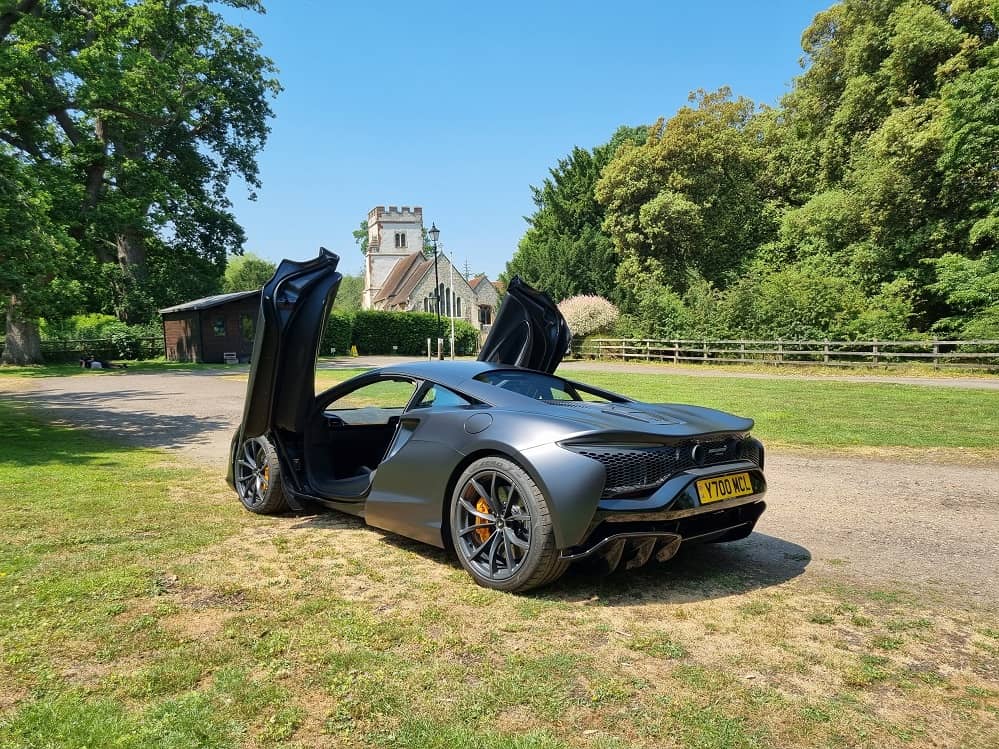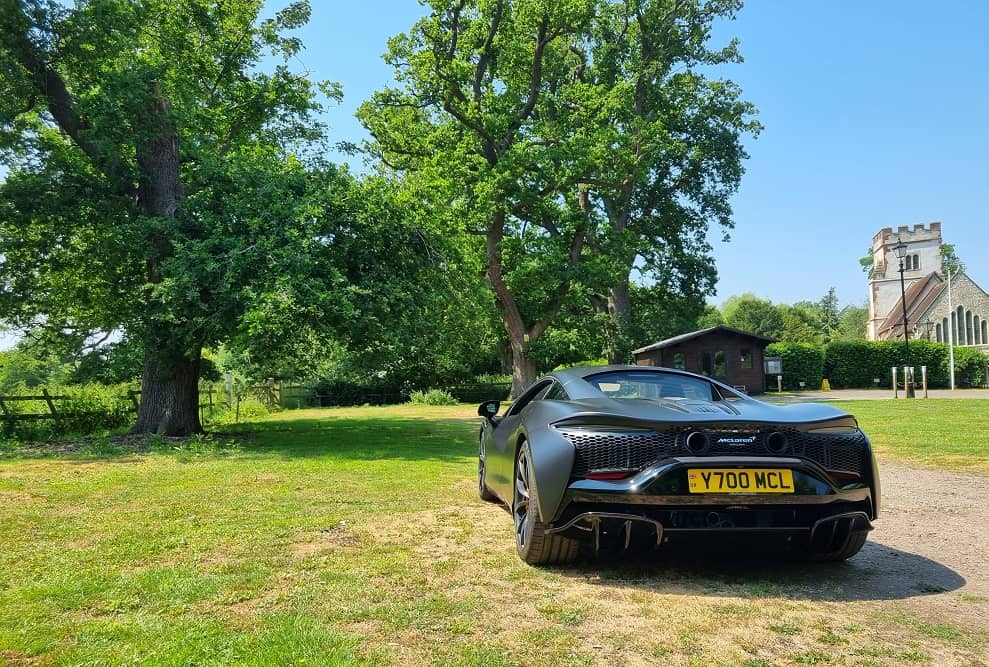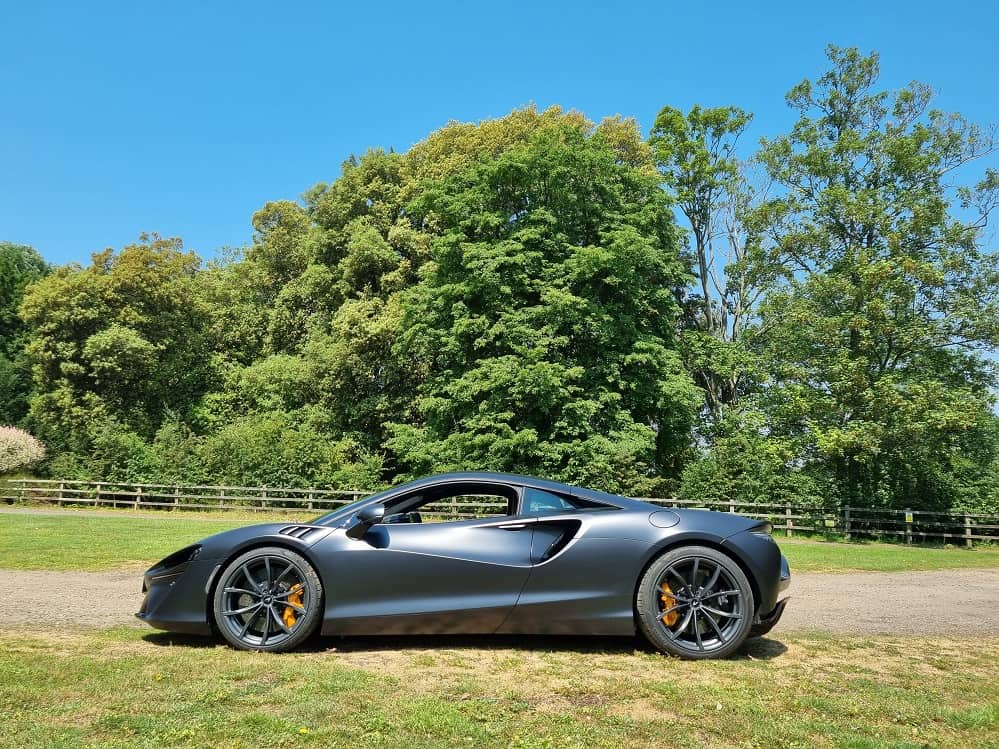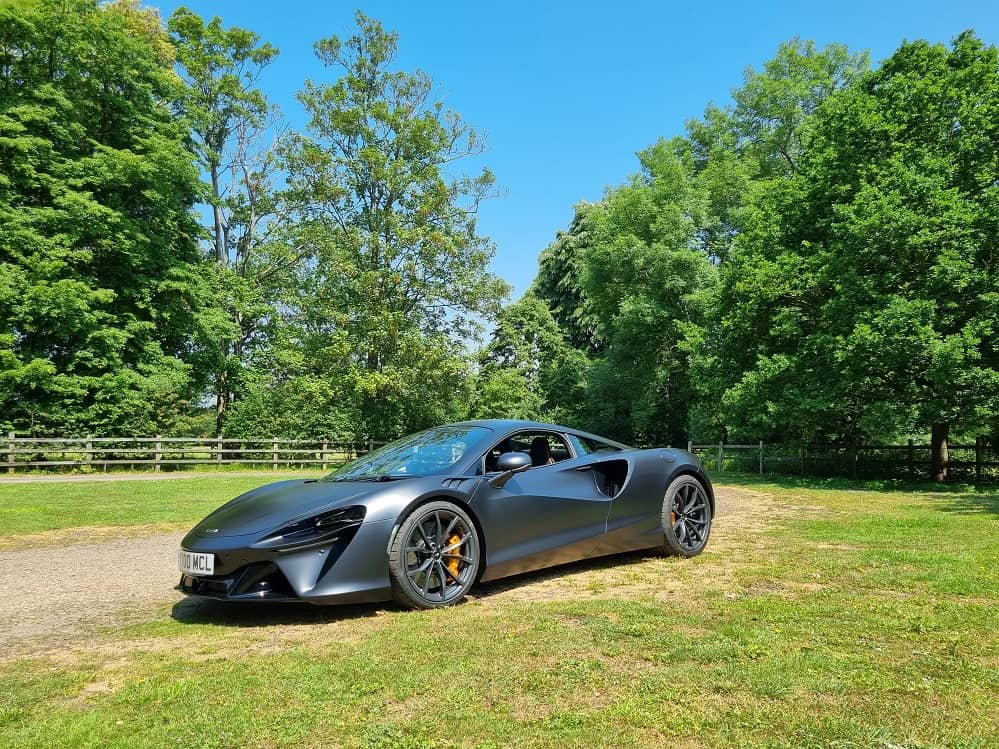The rapid electrification of the automotive industry is leaving no manufacturer unturned. At the volume production end of the market, a slurry of EVs have hit the market, if not the mark with customers. An apologetic charging infrastructure means that home charging is essential. Which in turn means that you need a drive. Consumers have been flocking back to diesel for its enhanced mpg. Unintended consequences and all that. In the middle, we have hybrids; a bit of internal combustion and a bit of battery. The perfect compromise? Perhaps. At the supercar end of the market, an opportunity has been identified to offer hybrid driving in such a way that is results in a significant uptick in power. Enter the McLaren Artura.
So much of the McLaren Artura is familiar; the aesthetics, the driving position, the steering. Yet so much of the McLaren Artura is different; a V6 instead of a V8, a hybrid powertrain, much of the unseen underpinnings of the car’s architecture.
McLaren has been in the challenging supercar market for a decade now. In that time, an awful lot has changed. The McLaren P1, a halo car for the organisation, featured hybridisation but wasn’t intended for larger scale production like the McLaren Artura is. That makes this car incredibly important for the folks in Woking.
The McLaren GT, a car we really liked, didn’t quite bring the punters flocking. The McLaren 720S, a car adored by all who’ve been lucky enough to have driven one, did. Specials such as the McLaren 765LT also went down well, whereas the roofless McLaren Elva did not. It’s clear that McLaren, like all manufacturers, has experienced some hits and misses in its decade in business. What, then, of the McLaren Artura?
Living with the McLaren Artura
The McLaren Artura being a supercar, there are one or two inevitable compromises on practicality. That said, McLaren has always been intelligent with the use of space inside its cars and this is no different. There’s room for a couple of weekend bags in the front trunk and a sizeable parcel shelf behind the seats. You could probably get your golf clubs across the back; you can certainly get a cricket bag in.

One pack to note here is the technology pack. It comes in at £6800 but is worth the investment. It brings a 360-degree park assist mode, for starters. When parking your £189,000 car, this is most useful. It also brings the Bowers & Wilkins audio upgrade, which again feels like a must have. Even with the windows down darting along, the clarity of the system is superb. The no cost option practicality pack brings the nose lift function and again this is something you’ll need. It makes getting over speed bumps easy, removing that fear of an impending scraping sound.
Across the UK’s battered roads, the McLaren Artura acquits itself impressively. I don’t think it’s quite as smooth as the McLaren 720S, but this could be attributed to the extra weight of the battery. It’s far from uncomfortable at any rate. Dial the suspension from comfort into sport and through to track, however, and it’s too much for our roads. It’s an impressive system, with every mode having a distinct feel. On the road it’s best to leave the suspension in comfort and dial up the powertrain instead.
What’s the McLaren Artura like to drive?
The McLaren Artura features two dials on the binnacle which is attached to the steering column. In yesterday’s McLarens you had to press ‘active’ in the centre console before changing the settings. It’s far more intuitive now and makes it very easy to change the settings with minimal fuss or distraction.
It all plays into the rather wonderful ergonomics of the McLaren Artura. Everything is easy to access, leaving you free to focus on the serious business of driving. The seating position, like all McLarens, is spot on. The view forwards and backwards is commanding and it fills you with confidence from the moment you get in. Even the standard clubsport seats are adjustable to your perfect position.

Then there’s the steering. I get a bit giddy before any opportunity to drive a McLaren simply because of the steering. No one does it better. Mercifully, the same is true of the McLaren Artura. It begins with the steering wheel itself. Now a conduit for shortcuts to all sorts of functionality for most manufacturers, the McLaren Artura retains McLaren’s jargon-free wheel. It’s just a steering wheel; no buttons to press here.
It’s wonderfully tactile, brimming with feedback. The wheel comes alive in your hands over flowing B-roads and makes it simple to judge what’s going on beneath you. It also means that you can enjoy the McLaren Artura at any speed, you don’t need to drive like a lunatic to appreciate it. Plotting a course through bends is a joy as the car is constantly communicating with you.
The brakes are carbon ceramics as standard, 390mm six-piston at the front and 380mm four-piston at the rear. This means they’re very big and very good at stopping the McLaren Artura. Which is useful, because it’s really rather fast…
What’s the McLaren Artura really like to drive though?
We best mention the power output at this stage. The familiar V8 is replaced with a V6, but the 7.4kWh battery adds 95bhp to the setup. Not that the 3.0-litre twin-turbo charged V6 is lacking in potency. With all systems firing, the McLaren Artura puts down 671bhp and 720Nm of torque. It makes a car weighing 1500Kg positively fly.
0-60mph is ticked off in just 3.0secs. It’s the in-gear acceleration, however, where the McLaren Artura really comes into its own. Pin the throttle from 50mph and I’m sure this thing is a shade quicker than the 720S. The use of the battery to torque fill means that there’s no let up during upshifts. The McLaren Artura just keeps on pulling. It’s hugely impressive and somewhat startling the first couple of times you do it. The cabin was punctuated by some blue language, not that you’d have heard it over the V6.

One point to note is the gearbox here. It has eight forward gears and an electric reverse gear. Left in auto, even with the powertrain dialled up to track, it can be a bit slow to react and usually selects one gear too high in the range. Not to worry though, for it simply brings the carbon fibre paddles into play. Press ‘manual’ on the powertrain dial and it’s over to you. Drop it down to the gear you need, get the revs at 3500rpm+ and nail the throttle: you’re at the horizon before you know it. Green and red lights flash up to let you know it’s time to change gear the McLaren Artura keeps on surging forwards. It’s utterly intoxicating.
Conclusion
Throw that power and that chassis and that steering together, and the McLaren Artura absolutely hits the mark. Designed to be a driver’s car, it doesn’t disappoint. The electrification also comes into its own. In some supercars you risk offending your neighbours with every start up and return home. Click the McLaren Artura through to electric and it wheezes along. It’s rather loud for an EV, but considerably more polite than a howling V8.
At low speeds there is some drone from the exhaust, notably at 1100rpm. It’s insufferable but using electric mode to crawl through traffic negates this. Stated range is 19 miles, as with all electric ranges, however, you can take a bit off. It’ll do 12 miles comfortably.

You can plug it in at home and charge overnight, or you can use the engine. Put it in sport or track and set it to charge to max and this is done surprisingly briskly. There’s not much consumption penalty, either. On a long drive the McLaren Artura will achieve 30mpg+. I achieved 20.9mpg over 176.9 miles, but in the interests of serious journalism largely stayed away from motorways. You’ll forever be seeking open roads.
There’s so much to love about the McLaren Artura. I could’ve written individual sections on the steering and the brakes and the driving modes. It drew excitable comments from passers. Heads were turned everywhere it went. It’s every inch a supercar, but with a thoroughly modern twist. If supercars are to survive then hybridisation and, eventually, electrification need to work. The McLaren Artura demonstrates that hybridisation can work brilliantly in a supercar. If nothing else, it signposts towards an encouraging future, combining thrills, feedback and head-turning aesthetics into one enthralling package. It feels every inch a McLaren and that’s a very good thing indeed.

